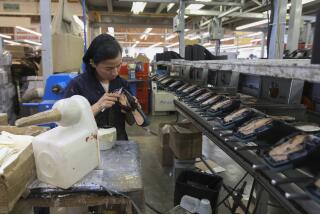For Japan, a Better Way
- Share via
Final figures are expected to show that Japan’s trade surplus with the United States last year soared to a whopping $50 billion, an increase of nearly one-third over 1984. With that kind of trend, can new congressional demands for protectionism be far behind? Probably not, but in any fresh clamor for cutting imports the old truism ought not to be lost sight of: Protectionism is never cost-free. The only certain result of crimping foreign access to American markets would be an inflationary run-up in prices paid by American consumers, and this is something that the nation can live happily without. Far better to avoid new restrictions on imports, and push instead for increased overseas sales of American products.
After a lot of effort, some progress in that direction has been made with Japan. Last month, agreement was reached to lower the barriers that have restricted sales of American medical equipment and pharmaceuticals in the lucrative Japanese market. Now a second issue of trade contention appears to have been resolved: Japan says that it will liberalize U.S. access to its rapidly expanding telecommunications market.
In two other targeted areas, however, U.S. negotiators have been left unsatisfied. Little progress has been made to win easier entry into Japan for U.S. semiconductors. And import barriers to American forest products, notably plywood, remain high. This latter area may prove to be the most intractable of all. A lot of trees are commercially harvested in Japan, and small growers and mill operators represent a powerful national constituency. Even the politicians who most understand the need to open Japan’s markets are unenthusiastic about including forest products.
Getting market-opening agreements from Tokyo has always been a painfully slow process. Getting Japan’s powerful bureaucracy to implement those agreements once they are reached is often even more difficult. In Tokyo this week Sen. John C. Danforth (R-Mo.) warned that Japan must be prepared to double its imports of manufactured goods over the next five years or risk seeing the international trading system on which its prosperity depends fall apart. A freer import policy is the clearly preferable way for Japan to help adjust its huge trade surplus. The alternatives to adopting such a policy are unpleasant, and would do neither Japan nor the United States any good.
More to Read
Inside the business of entertainment
The Wide Shot brings you news, analysis and insights on everything from streaming wars to production — and what it all means for the future.
You may occasionally receive promotional content from the Los Angeles Times.










